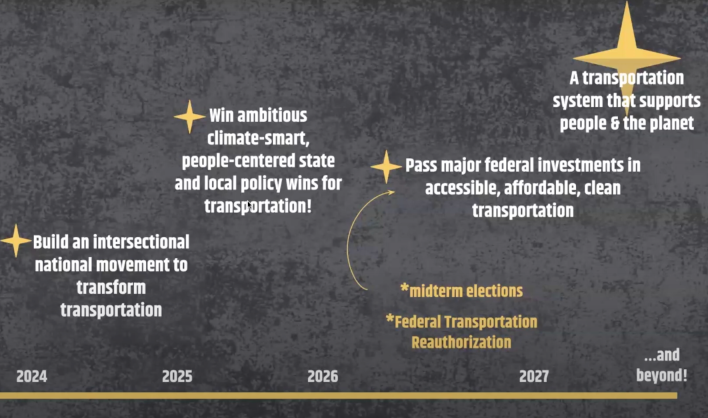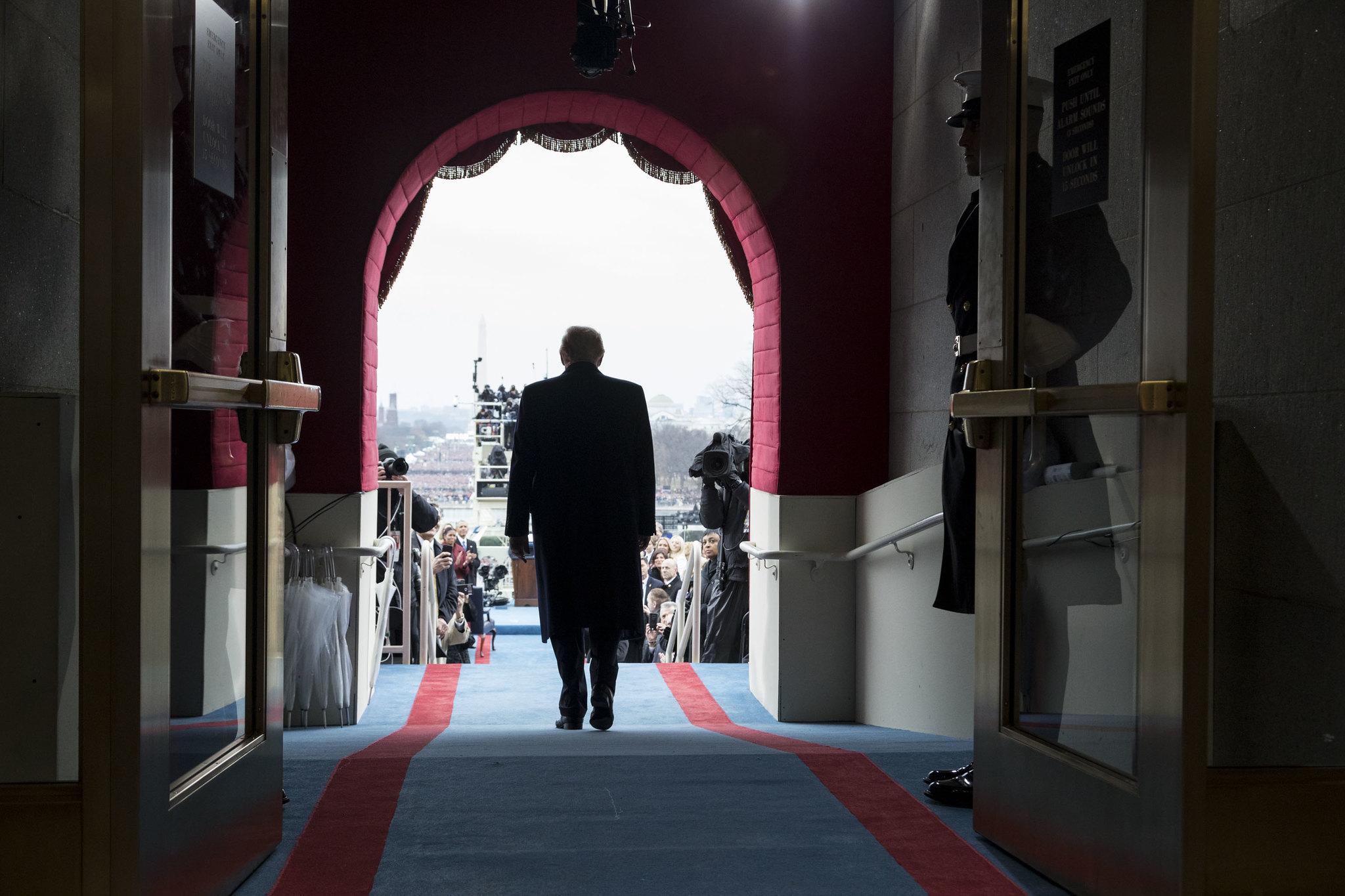Transportation reform advocates have no plans to compromise their goals as the Trump administration takes power — and every intention of growing their coalition into an undeniable movement for change, a top advocacy group argues.
On a recent organizing call hosted by the Green New Deal Network, advocates from climate, labor, and transit justice movements across America gathered to strategize about how to win their shared transportation goals in the next four years — even as transit-hostile lawmakers seem poised to seize control of all three branches of government.
Those steep odds, though, are only prompting advocates to grow their numbers and get organized, not dilute their ambitions.
“We're not going to negotiate with ourselves," said Molly McKinley of the National Campaign for Transit Justice. "We're not going to lower our own bar ... just because of the outcome of this election. We'll negotiate to make progress along the way, but we're not going to be changing our North Star.”

That "North Star," Saul Levin of the Green New Deal Network stressed, is an "accessible, affordable, clean, reliable" transportation system that gives residents real choices about how they get around, rather than the car-dependent status quo that's forced on virtually everyone whether they like it or not. And to win it, he says advocates need to focus their next two years on building strong, connected networks of local power, so they can remake their community's transportation networks today and retake Congress in the mid-terms.
“We're obviously not in an ideal position in the context of a Republican trifecta, or [even] in the context of a split Congress," Levin added. "We would have a very difficult time passing major policy [today]. But you don't pass policy by developing it the day before [it’s introduced.] So what we've been doing for the past year —and what we're going to continue to do — is actually develop gold standard policy and improve existing policies.”
As advocates' ranks grow, Levin says they next need to set their sights on passing progressive state and local transportation laws, which often can still be funded and implemented without extensive federal support. Minnesota's recent state transportation bill, he says, offers a particularly salient example of how U.S. communities can pass visionary transportation legislation, even if Gov. Tim Walz isn't headed to the Naval Observatory.
“We need to pass amazing stuff at the state and local level," he added. "We need bus rapid transit in the city of Detroit; we need to fix up the CTA in, like, five different ways — if not 20 — in the city of Chicago; we need to implement congestion pricing in New York City, and we need inter-regional and rural transit options all across the United States of America.”
Strong state and local laws could also provide proof of concept when it comes time for Congress to reauthorize its core federal transportation programs in September of 2026. If history is any indication, negotiations over that process are likely to drag on for a while, and lawmakers are likely renew the Bipartisan Infrastructure Law for at least a year — giving Democrats a critical window to reclaim the House, Senate or both in the midterm elections.
If that happens, the coalition says they might even have the numbers they need to win a far more transformative new reauthorization bill, even with Trump sitting in the Oval Office.
And some of that transformational legislation is already being written. Sen. Ed Markey, who also joined the call, has already introduced the Complete Streets Act, which would require cities to put vulnerable road safety first in order to access federal highway funds — and require them to spend five percent of those funds on protecting people who move outside cars.
The Massachusetts senator's Green Streets Act would also make streets safer by requiring states to reduce how many miles their residents travel per capita, and it would also make them cleaner by setting declining highway emissions targets, and requiring states who don't meet them to take action to reduce the pollution.
"You have to continue to fight to lift the gaze of everyone to the constellation of possibilities," added Markey, continuing the call's astronomical theme. "Because even face of a new and brutal administration our goals have to remain the same. We just have to drastically reimagine transportation in this country if we're going to save the planet and its people."
Even setting the literal fate of civilization aside, though, several members of the call pointed out that reforming transportation would be an incredible deal for labor, too — and they're ready to emphasize how building a less car-dependent world would benefit American workers.
Jeff Joines of the Brotherhood of Maintenance of Way — an organization which, together with Brotherhood of Locomotive Engineers, represents half of America's railroad workers — cited California's high-speed pail project as an example, which has created more than 14,000 union construction jobs to date.
“It costs more to build a mile of highway than it does a mile of high-speed rail," Joines added. "So when we convince those folks that that's absolutely the case — and [when] we can speed up this [environmental review] process — we can solve their congestion on their highways by taking millions of cars off [the road], and putting those butts in a high-speed rail train, or an Amtrak train or a transit train.”
If labor unions join forces with the universe of other advocates who agree that our country needs a transportation revolution, some say they could create a powerful movement for change, even in a GOP-controlled government.
“This coalition of labor and climate activists is going to create the union-made renewable energy that will power our movement through the Trump-fueled Dark Ages and back into a better world," added Markey. "The planet is sick, and it's making our people sick. There are no emergency rooms for planets, but the prescription for what ails us is clear: we need a whole-of-government approach to address the climate crisis while building good union jobs and bringing justice for everyone.”
And while that fight won't be easy, advocates like Levin are ready — and they're not mincing words.
“We're not going to stop because Donald Trump the neo-fascist got elected to be president of the United States," her added. "We're going to [turn] our anger and our frustration into building really fucking fast trains, and really beautiful bus systems, and really safe bike lanes. We're going to take the fury that powers us after this moment … and we're going to change transportation in this country forever.”
To join the Green New Deal Network's next organizing call, sign up here.






